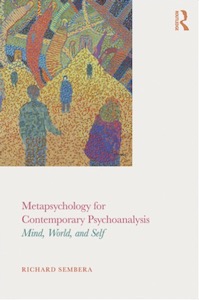 Metapsychology for Contemporary Psychoanalysis (Routledge, 2017) was originally supposed to be called "Mind, World, and Self" because that's what it's really about, but the publisher preferred a more descriptive title, so we went with that.
Metapsychology for Contemporary Psychoanalysis (Routledge, 2017) was originally supposed to be called "Mind, World, and Self" because that's what it's really about, but the publisher preferred a more descriptive title, so we went with that. Metapsychology for Contemporary Psychoanalysis (Routledge, 2017) was originally supposed to be called "Mind, World, and Self" because that's what it's really about, but the publisher preferred a more descriptive title, so we went with that.
Metapsychology for Contemporary Psychoanalysis (Routledge, 2017) was originally supposed to be called "Mind, World, and Self" because that's what it's really about, but the publisher preferred a more descriptive title, so we went with that.
Freud saw human beings as essentially pleasure-seeking; ultimately, for him, all mental conflict originated in frustrated desire. While this model does help us understand some complaints, such as classical hysterical symptoms, it does not accurately describe all of them. Freud himself recognized the limitations of his approach in cases of severe trauma, which can result in people repeatedly seeking out experiences that are painful and damaging. Both Freud and later theorists struggled to fill in the gaps in his account of human nature, but in my view, not entirely successfully.
In my book I take a step back, avoiding theories based on biological hypotheses, and focus on understanding what actually happens in a psychoanalytic session: clients struggle to give voice to their internal states while an analyst struggles to understand them and, in turn, to articulate this understanding in a way that is useful and helpful to clients. In so doing, I strive to replace the classical and limited Freudian model of the mind with a perspective that is focussed on the inherent human need for self-knowledge. While acknowledging the central place of human passion in mental life, I complement this understanding with an appreciation of the equally important role of insight in mental health and healing.
Previous theorists such as Melanie Klein and Wilfred Bion made passing reference to the "epistemophilic impulse" but treated it as a sort of shadowy companion of the two basic drives that Freud recognized, Eros and Thanatos (love and death). By way of contrast, my book emphasizes the central role that self-understanding plays in coming to terms with our human needs and passions.
Some distinguishing features of the book include its in-depth theory of trauma, its careful distinction between overwhelming experiences and traumatic experiences, and its conception of the traumatic response as playing a central role in normal mental functioning.